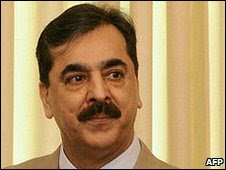 The Muslim-majority state of Pakistan occupies an area which was home to some of the earliest human settlements and where two of the world's major religions, Hinduism and Buddhism, were practised.
The Muslim-majority state of Pakistan occupies an area which was home to some of the earliest human settlements and where two of the world's major religions, Hinduism and Buddhism, were practised.FACTS
•Full name: Islamic Republic of Pakistan
•Population: 180.8 million (UN, 2009)
•Capital: Islamabad
•Largest city: Karachi
•Area: 796,095 sq km (307,374 sq miles), excluding Pakistani-administered Kashmir (83,716 sq km/32,323 sq miles)
•Major languages: English, Urdu, Punjabi, Sindhi, Pashto, Balochi
•Major religion: Islam
•Life expectancy: 66 years (men), 67 years (women) (UN)
•Monetary unit: 1 Pakistani Rupee = 100 paisa
•Main exports: Textile products, rice, cotton, leather goods
•GNI per capita: US $980 (World Bank, 2008)
•Internet domain: .pk
•International dialling code: +92
President: Asif Ali Zardari
Asif Ali Zardari won the presidential race of 6 September 2008 by a big majority. His election by Pakistan's legislators came a few weeks after his predecessor Pervez Musharraf resigned under threat of impeachment.
President Zardari has accepted a reduction of his powers
Profile: Asif Ali Zardari
At his swearing-in ceremony, Mr Zardari said he was accepting the post of president in the name of his assassinated wife, Benazir Bhutto.
Mr Zardari had long lived in the shadow of his late charismatic wife, who was twice Pakistan's prime minister and head of the Pakistan People's Party (PPP) - a position Mr Zardari inherited upon her death in December 2007.
Asif Zardari married Ms Bhutto in 1987 and held the positions of federal environment minister and federal investment minister during her tenure as premier.
But Mr Zardari was also controversially referred to as "Mr 10%" following allegations of corruption. For this, and for murder charges of which he was later cleared, he spent two separate terms in prison totalling eleven and a half years.
In December 2009, the Supreme Court ruled illegal an amnesty law introduced in 2007 by former President Musharraf offering Mr Zardari immunity from corruption charges. The law was designed to allow Mr Zardari's late wife, Benazir Bhutto, to return to the country.
Under pressure to relinquish some of the powers accumulated by Pakistan's presidency in four decades of recurrent military rule, Mr Zardari in April 2010 presented to parliament proposals for sweeping constitutional reform.
The measures were designed to strip the president of key powers - including the right to dissolve parliament, dismiss the government and appoint the head of the powerful military - and in effect restrict the office to a largely ceremonial role.
The constitutional amendments bill received overwhelming support in both houses of parliament
On becoming president, Mr Zardari pledged to tackle the problem of Islamic militancy. Following allegations by India that the devastating 2008 attacks on the city of Mumbai were orchestrated in Pakistan, he insisted his country was ready to cooperate with other countries in the fight against terrorism.
Asif Ali Zardari was born on 26 July 1955. He comes from a prominent family in Pakistan's Sindh province and has one son and two daughters. His son, Bilawal Zardari, was born in 1988 and is co-chairman of the Pakistan People's Party.
Prime Minister: Yusuf Raza Gilani
Yusuf Raza Gilani became the head of the coalition government in March 2008, after the Pakistan People's Party (PPP) won the most votes in elections in February.
Mr Gilani has learned a reputation as a PPP loyalist Mr Gilani had long been a respected figure within the PPP. He joined the party in 1988, when it was still very much in the political wilderness, and soon earned a reputation for unwavering loyalty to the Bhutto family.
He was Speaker of parliament from 1993 to 1996, during Benazir Bhutto's second stint as premier.
In 2001, two years after Pervez Musharraf seized power in a military coup, Mr Gilani was found guilty of making illegal government appointments while Speaker and was jailed for five years.
He maintains that the charges were brought as part of an attempt by Mr Musharraf to pressurise him into leaving the PPP. He was exonerated and freed in 2006.
Mr Gilani was born in 1952 in Karachi but his family comes from the Punjab and was active in Punjabi politics for generations. His grandfather and great-uncles were members of the All-India Muslim League, which campaigned for a separate state for Muslims, and his father served as a provincial minister during the 1950s.
After completing an MA in journalism at the University of Punjab, Mr Gilani first entered politics in 1978 as a member of the Muslim League, but ten years later switched to the PPP



